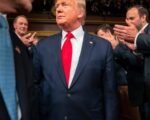Gold prices edged higher as investors adopted a cautious stance ahead of Donald Trump’s latest tariff announcement. Meanwhile, Heathrow Airport faces scrutiny after warnings about its power supply surfaced just days before a major disruption brought operations to a halt.
Gold Nears Record as Investors Seek Safe Haven
Gold prices inched up by 0.5% on Wednesday, hovering near the record high reached earlier this week. The rise comes as global markets brace for Trump’s sweeping tariffs, set to be unveiled at an event titled “Make America Wealthy Again.”
Investors are flocking to safe-haven assets as fears of a global trade war intensify. Market analysts say the expected tariffs will impact a broad range of industries, fueling uncertainty.
- Gold prices have surged over 10% since the start of the year.
- Investors anticipate potential retaliatory tariffs from key US trading partners.
- The US dollar remained stable despite market jitters.
Hargreaves Lansdown’s Susannah Streeter noted, “Investors are on edge. This is not Liberation Day for the global economy—it’s more like a tightening noose.”

Heathrow’s Power Crisis: A Warning Ignored?
Just days before its recent operational meltdown, Heathrow Airport was reportedly warned about vulnerabilities in its power supply. The revelation has raised questions about infrastructure preparedness at one of the world’s busiest travel hubs.
An internal report flagged potential failures in Heathrow’s electrical network. Despite this, no immediate action was taken to prevent the widespread disruption that ensued.
The outage, which lasted several hours, led to:
- Hundreds of delayed and canceled flights.
- Thousands of stranded passengers.
- Increased pressure on airline compensation policies.
A Heathrow spokesperson confirmed an investigation is underway, but travelers and industry experts are demanding answers. One airline executive, speaking anonymously, said, “This wasn’t just a freak accident—there were warnings. The question is, why weren’t they addressed?”
European Stocks Slide as Pharma Sector Hit Hard
European markets saw a sell-off, with pharmaceutical stocks taking the biggest hit ahead of the US tariff announcement. The Stoxx 600 healthcare index dropped 2.5%, its lowest level since December.
Germany’s Bayer and France’s Sanofi led the losses, with UK-based AstraZeneca and GSK also sliding.
| Stock | % Change |
|---|---|
| Bayer | -4.7% |
| Sanofi | -3.3% |
| AstraZeneca | -2.4% |
| GSK | -3.3% |
The broader European indexes also took a hit:
- London’s FTSE 100 fell by 0.55%.
- Germany’s DAX dropped by 1%.
- France’s CAC slid by 0.35%.
- Italy’s FTSE MIB was down 0.77%.
Analysts suggest pharmaceutical companies may be a key target of the new tariffs, compounding concerns over supply chain disruptions and rising costs.
Ireland Faces Tariff Fallout as Unemployment Ticks Up
Ireland is bracing for economic headwinds, with the country’s unemployment rate ticking up to 4% in March from a record low of 3.9% in February. The increase, while modest, comes as analysts warn of significant risks to the Irish economy if pharmaceutical exports face heavy tariffs.
The pharmaceutical sector accounts for a major share of Ireland’s exports. If targeted by Trump’s measures, the economic impact could be severe.
Christine Lagarde, president of the European Central Bank, cautioned, “The negative effects will be felt globally. The real question is how deep and long-lasting the damage will be.”
With markets on edge and geopolitical tensions rising, all eyes are now on Washington for the official announcement of Trump’s next trade move.








